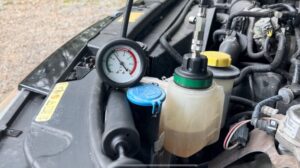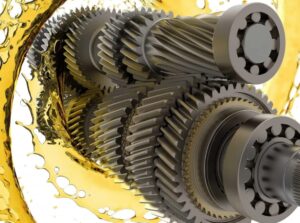When to Change Gear Oil
What is Gear Oil Used For
Gear oil is a lubricant specifically formulated for transmissions, transfer cases, and differentials in cars, trucks, and other machinery. Its primary purpose is to reduce friction and wear on gear components, prevent overheating by dissipating heat, and protect against rust and corrosion. It also helps to ensure smooth gear shifting and operation.
Signs That Indicate Changing Gear Oil

- Noisy Gears: Unusual noises like whining, humming, or clunking can indicate that the gear oil is low or contaminated.
- Difficulty Shifting Gears: Hard shifting or slipping gears may suggest that the gear oil is not providing adequate lubrication.
- Vibration: Excessive vibration when the vehicle is in motion can be a sign of gear oil issues.
- Oil Leaks: Visible gear oil leaks under the vehicle or near the differential can signal that a change is needed.
- Burning Smell: A burnt odor coming from the gearbox or differential area indicates overheating, possibly due to degraded gear oil.
Why is My Transmission or Differential Oil Low?
Several reasons can cause low transmission or differential oil:
- Leaks: Damaged seals, gaskets, or cracks in the transmission or differential housing can lead to oil leaks.
- Poor Maintenance: Neglecting regular maintenance checks and oil changes can result in low oil levels.
- High Temperatures: Excessive heat can cause gear oil to break down faster and evaporate.
- Wear and Tear: Over time, components like gears and bearings can wear down and increase oil consumption.
Why is My Gearbox Slipping or Not Selecting Gears?
Gear slipping or difficulty in selecting gears can be caused by:
- Low Gear Oil: Insufficient lubrication can cause gears to slip or not engage properly.
- Worn Clutch: A worn-out clutch can cause gear slipping, especially in manual transmissions.
- Damaged Synchros: In manual transmissions, damaged synchronizer rings can prevent smooth gear selection.
- Faulty Solenoids: In automatic transmissions, faulty solenoids can lead to shifting problems.
Why is There a Burning Smell from My Gearbox/Differential?

A burning smell from the gearbox or differential typically indicates overheating, which can be due to:
- Low or Degraded Gear Oil: Insufficient lubrication can cause excessive friction and heat.
- Heavy Loads: Towing heavy loads or driving in extreme conditions can increase the temperature.
- Worn Components: Worn gears and bearings can generate excessive heat and produce a burning smell.
Why is a Sound Coming from My Gearbox/Differential?
Unusual sounds from the gearbox or differential can be due to:
- Low Gear Oil: Insufficient lubrication can cause whining, humming, or clunking noises.
- Worn Gears or Bearings: Damaged or worn gears and bearings can produce grinding or knocking sounds.
- Loose Components: Loose parts within the transmission or differential can cause rattling or clunking noises.
Why is My Gearbox Making Noise in Neutral?
If your gearbox is making noise in neutral, it could be due to:
- Worn Bearings: Worn or damaged bearings can produce a humming or whining noise.
- Gear Misalignment: Misaligned gears can cause unusual noises even when the gearbox is in neutral.
- Low Gear Oil: Insufficient lubrication can cause components to make noise.
What Happens if the Gear Oil is Not Changed?
Failing to change gear oil can lead to several problems:
- Increased Wear and Tear: Old or contaminated oil cannot lubricate properly, leading to increased friction and wear.
- Overheating: Degraded oil cannot dissipate heat effectively, causing overheating and potential damage.
- Gear Slippage: Inadequate lubrication can cause gears to slip or not engage properly.
- Component Failure: Prolonged neglect can lead to severe damage and costly repairs.
Lifespan of Gear Oil

How Often Should You Replace Gear Oil?
Gear Oil: Why It's Important for Your Car
How Do I Know Which Gear Oil to Use?
Choosing the right gear oil for your vehicle involves considering several factors:
- Vehicle Specifications: Refer to your vehicle’s owner manual for the manufacturer’s recommended gear oil type and viscosity.
- Driving Conditions: Consider the driving conditions you typically encounter, such as extreme temperatures, heavy loads, or off-road driving.
- Type of Gear Oil: Synthetic gear oils offer better performance and longevity compared to conventional oils. However, they may be more expensive.
- Viscosity: Ensure the gear oil’s viscosity matches the requirements specified in your vehicle’s owner manual.
Final Thoughts
Regular maintenance and timely changing of gear oil are vital for the optimal performance and longevity of your vehicle’s transmission and differential systems. By paying attention to the signs indicating the need for a gear oil change and choosing the right type of oil, you can ensure smooth gear shifting, reduce wear and tear, prevent overheating, and avoid costly repairs. Always refer to your vehicle’s owner manual for specific recommendations and service intervals.
FAQs

Radiator Stop Leak UAE: Quick Fix for Vehicle Cooling System Leaks
Radiator Stop Leak UAE: Quick Fix for Vehicle Cooling System Leaks Discover More Introduction: The Unforgiving UAE Climate and Your Vehicle’s Lifeline The United Arab Emirates’ automotive landscape is defined by extremes. Ambient temperatures that regularly surpass 45°C (113°F), coupled with intense urban congestion and long, high-speed desert drives, create a perfect storm of thermal stress for every vehicle. In this environment, your engine cooling system is not merely a subsystem; it is the single most critical component preventing catastrophic engine failure.

What Type of Transmission Oil in UAE Does My Car Need? Your Complete Guide
What Type of Transmission Oil in UAE Does My Car Need? Your Complete Guide Discover More Navigating the vast, sun-baked highways of the United Arab Emirates—from the dynamic urban sprawls of Dubai and Abu Dhabi to the majestic desert dunes and the tranquil mountain passes of the Hajar range—places extraordinary mechanical and thermal stress on every component of your vehicle. While conscientious drivers often prioritize engine oil changes, the vital lifeblood safeguarding the transmission, the complex heart of your car’s

Guide to UAE Turbine Oil Selection Application & Management for Industrial Facilities
Guide to UAE Turbine Oil Selection, Application, and Management for Industrial Facilities Discover More In the hyper-competitive industrial landscape of the United Arab Emirates, where operational excellence directly translates to economic advantage, turbine lubrication represents a critical nexus of reliability engineering and strategic asset management. This comprehensive guide, developed with technical insights from Rumanza Lubricants, provides an unprecedented deep dive into the science, selection criteria, and life-cycle management of turbine oils specifically engineered for the extreme operating conditions of the

Synthetic vs. Mineral Hydraulic Oil in UAE : Which is Best for Your Operation?
Synthetic vs. Mineral Hydraulic Oil in UAE : Which is Best for Your Operation? Discover More Across the dynamic landscape of the United Arab Emirates—from the megaprojects of Dubai Marina to the intricate conveyor systems of Jebel Ali Port, from the massive hydraulic shovels in Al Dhafra quarries to the precision automated lines in Abu Dhabi’s industrial cities—the silent, powerful force of hydraulics is indispensable. These systems convert fluid power into monumental force and precise motion. At the core of

What is a Pour Point Depressant? | Benefits, Uses & How It Works Mechanism
What is a Pour Point Depressant? | Benefits, Uses & How It Works Mechanism Discover More In the intricate world of lubricant formulation, few additives play as critical yet understated a role in cold-weather operability as Pour Point Depressants (PPDs). These specialized chemical compounds are the linchpin that prevents machinery from seizing up when temperatures plummet. This in-depth guide goes beyond the basics, exploring the sophisticated chemistry, detailed mechanism, nuanced benefits, and practical considerations of PPDs. We will also examine the

Guide to Gasoline Engine Oils for UAE’s Extreme Climate: Engineering Peak Performance
Gasoline Engine Oils for UAE’s Extreme Climate: Engineering Peak Performance Discover More In the heart of the Arabian Peninsula, the United Arab Emirates stands as a testament to human ambition, with its engineering marvels and endless highways. Yet, this environment of soaring achievement is also one of the most punishing on Earth for machinery. For your vehicle—whether a nimble city sedan, a powerful family SUV, or a high-performance sports car—the UAE’s climate is a relentless adversary. The choice of engine

What are Polyol Ester Oils & Lubricants – Properties & Applications
What are Polyol Ester Oils & Lubricants – Properties & Applications Discover More In the intricate world of industrial machinery, automotive engines, and advanced refrigeration systems, the choice of lubricant is not merely a maintenance task—it’s a critical engineering decision. While conventional mineral oils have served us for over a century, the demands of modern technology require fluids that can perform under extreme pressure, temperature, and environmental stress. This is where synthetic lubricants, specifically Polyol Ester oils, come to the forefront.

Guide to Choosing the Right Lithium Complex Grease in UAE
Guide to Choosing the Right Lithium Complex Grease in UAE for Unbeatable Performance Discover More In the heart of a region defined by its ambition and extreme climate, the machinery that builds and powers the UAE operates under immense pressure. From the towering cranes sculpting Dubai’s skyline to the massive haul trucks in Abu Dhabi’s industrial zones and the relentless conveyor systems in Jebel Ali Port, every moving part is a critical link in the chain of progress. Protecting these

Lithium Grease UAE – Buy Multi-Purpose Lubricant Grease
Lithium Grease UAE – Buy Multi-Purpose Lubricant Grease Discover More In the relentless engine of the United Arab Emirates’ economy—where monumental construction, non-stop logistics, and a climate of extreme heat and abrasive sand are the norm—the battle against friction and corrosion is perpetual. The integrity of a construction crane’s slewing ring, the smooth operation of a delivery fleet’s wheel bearings, and the silent efficiency of a hotel’s HVAC system all hinge on a single, critical decision: the choice of lubricant.